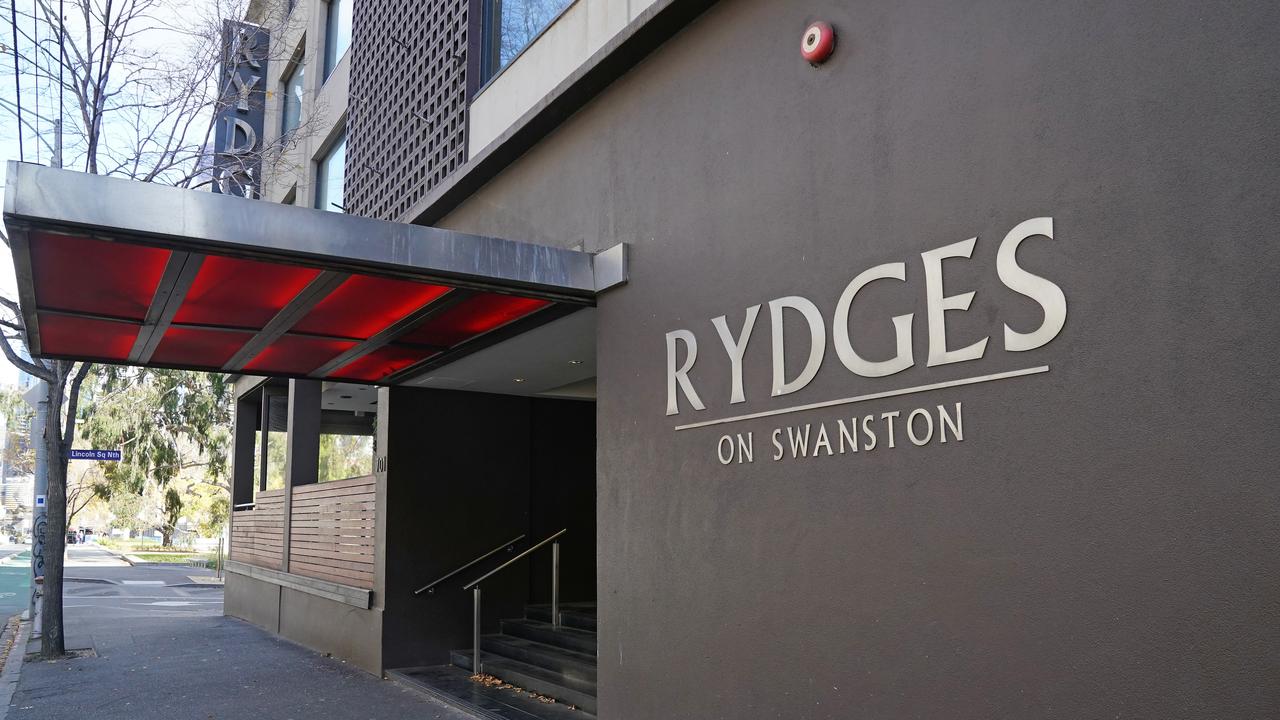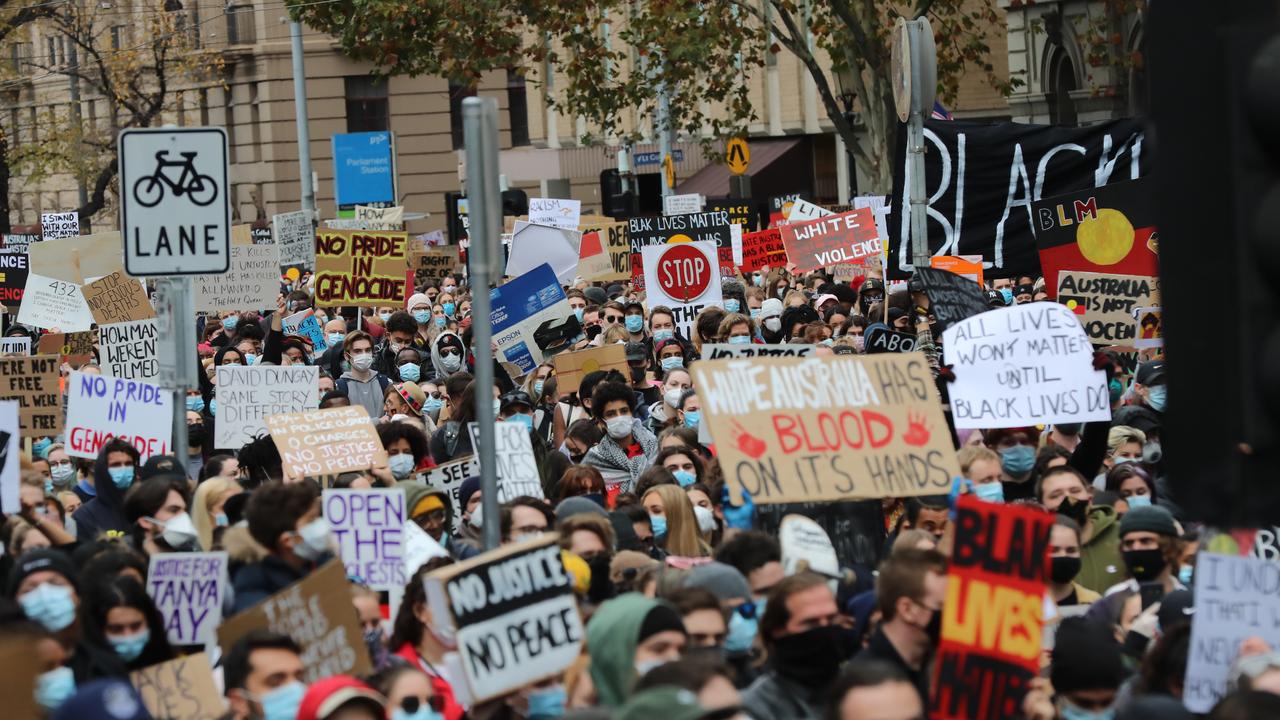The misconception Australians have about Victoria’s coronavirus outbreak
Many Australians believe Victoria’s coronavirus outbreak is linked to one controversial factor but the statistics show they are wrong.

Many people believe new coronavirus cases in Victoria are linked to the Black Lives Matter protests despite there being just four cases out of about 550 identified since the event.
About 42 per cent surveyed online last week thought many of the new cases in Victoria were linked to protesters, an Essential poll found.
Men were more likely to believe this than women and about 52 per cent of Coalition voters thought this was true, compared to 38 per cent of Labor voters and 22 per cent of Greens.
Queenslanders were the most likely to believe there was a link (49 per cent) and Western Australians the least likely (34 per cent). About 41 per cent of Victorians and 43 per cent of NSW residents agreed.
The survey got the views of 1085 people and only 37 per cent said they didn’t think it was true and another 20 per cent said they didn’t know.
Overall, about 14 per cent thought it was “definitely true” while another 28 per cent thought it was "probably true”.
This is despite statistics that show the overwhelmingly majority of community transmission cases since the protest have been linked to outbreaks at hotels and among family groups.
Only four people who attended the Black Lives Matter protests on June 6 have since been diagnosed with the virus and there’s no evidence to suggest they became infected at the event.
However, there has been an extra 550 cases in Victoria between the day of the protest and Wednesday, July 1.
So how did coronavirus numbers skyrocket in just one month?
GET A ROOM
The first Black Lives Matter protest took place on June 6 with experts expecting to see an increase in coronavirus cases within two weeks, around June 20.
On the day of the protest, Victoria reported no new daily cases and 1681 cases across the state at that point. New cases were in single digits during that first week and were being linked to returned travellers in hotel quarantine, aged-care residents, students and food workers.
Soon though, problems began to emerge.
An outbreak at the hotel Rydges on Swanston had already been identified. The hotel was being used to quarantine returned travellers and workers from Cedar Meats — where a separate outbreak had occurred.
The hotel continued to be linked to new cases. On the 10th, a 14th case was discovered and this had increased to 16 cases by the 13th.
Employees told The Age they though poor hygiene measures and training were responsible for the outbreak.
“It’s the security staff that are causing all the issues,” a worker said. “They’re not taught and trained in sanitation properly.
“They are walking around with the same gloves on, touching everything. They cross-contaminate everything.”
RELATED: Follow the latest coronavirus updates
RELATED: Victoria locks down Melbourne postcodes

By the 17th, another hotel had also been identified as a potential hot spot.
Five security guards at the Stamford Plaza Hotel, which is where positive cases are also transferred to, were later diagnosed with the coronavirus and the number of cases linked to the hotel has since risen to 31.
In bombshell claims revealed by the Herald Sun today, it reported that security guards at unspecified quarantine hotels had slept with guests, wore protective equipment for up to eight hours without changing and shook hands with each other.
This week Premier Daniel Andrews announced an inquiry into the hotel quarantine program after a genomic sequencing report found a “very significant number” of cases in late May and early June could be linked to a breach of infection control protocols by staff at the hotels.
“That left me in no doubt … there was a significant infection control problem and on that basis the inquiry has been announced,” he said.
KEEPING IT IN THE FAMILY
By June 20, new cases were in the double digits – daily cases had increased to 20 for a total of 1817 infections.
There had already been two outbreaks identified among interconnected family households in Melbourne’s northern and south-eastern suburbs. The first one was confirmed prior to the Black Lives Matter protests and the second one on the 14th.
Victoria’s Department of Health and Human Services noted the new cases on June 20 were overwhelmingly linked to known outbreaks, with 14 cases connected to clusters, six cases identified through routine testing, one from a returned traveller in hotel quarantine and four cases under investigation.
Of the day’s new cases, seven were linked to a family in Keilor Downs, which was the second family living in the north-western suburb to be at the centre of an outbreak.
The Keilor Downs family cluster has since ballooned out to 21 cases across eight households, with a further six cases at the Coles Chilled Distribution Centre in Laverton also linked to the family.
Another outbreak was centred around the H&M store at Northland, which one Black Lives Matter protester worked at. It’s unclear how the protester got the virus but experts don’t believe they were infected at the protest. The outbreak is now referred to as the North Melbourne family cluster as the majority of cases are within a large family group. There are now 30 cases linked to this outbreak.
Meanwhile a Coburg family outbreak has been linked to 15 cases including members of the same family living across three households.
A Wollert outbreak has been linked to 10 cases, a Brimbank family outbreak linked to nine and a Truganina family outbreak traced to five cases.

‘I REALLY DON’T THINK SO’
Last week Federal Health Minister Greg Hunt blamed Black Lives Matter protests held in Australian cities two weeks ago for a “relaxation” of attitudes towards social distancing.
“Many Australians have said, ‘Gosh, if it’s okay for 10,000 people to congregate and huddle together, surely it would be okay for 10 in my family’,” he said.
But other experts don’t believe the protests have contributed to the spike.
“I don’t think so, I really don’t think so,’’ Victorian Chief Health Minister Brett Sutton said last month.
“It is re-emerging because people are not doing things as stringently as they might have done a month, two months ago. But I don’t think the Black Lives Matter protest has contributed. We are not seeing people who have clearly acquired it there.”
It was a view echoed by his federal counterpart, the Deputy Chief Medical Officer Nick Coatsworth.
“There are … cases that have been diagnosed as people who have COVID-19 and attended the Black Lives Matter protest, but there is no evidence that there has been chains of community transmission that we are aware of through the Black Lives Matter protests,’’ he said.




